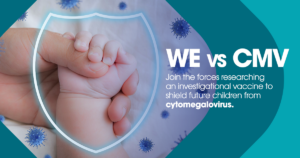June marks National CMV (Cytomegalovirus) Awareness Month, a dedicated time to educate and spread awareness about this common yet often misunderstood viral infection. CMV is a widespread virus that can have serious implications, particularly for pregnant women and their unborn babies. In this blog, we aim to shine a spotlight on CMV, specifically focusing on the risk of birth defects when a pregnant woman contracts CMV. By understanding the impact of CMV infection during pregnancy and spreading awareness, we can take steps towards prevention, early detection, and improved outcomes for families affected by this virus.
CMV and Birth Defects:
CMV is a common viral infection that belongs to the herpesvirus family. It can affect people of all ages, with most individuals acquiring the infection during childhood or adolescence. CMV stays dormant in the body and may reactivate years after initial infection, but unlike herpes, symptoms do not include sores. CMV is typically harmless in healthy individuals, often causing mild flu-like symptoms or no symptoms at all. However, the consequences can be severe when CMV is contracted during pregnancy.
When a pregnant woman becomes infected with CMV, there is a risk of transmitting the virus to her unborn baby. This can lead to a condition known as Congenital CMV infection, which can cause a range of birth defects and developmental issues. These can include hearing loss, vision problems, intellectual disabilities, motor impairments, and other long-term health complications.

The Importance of Spreading Awareness:
Raising awareness about CMV is crucial for several reasons. CMV is more prevalent than many people realize, affecting approximately 1 in 200 babies in the United States. By spreading awareness, we can help expectant mothers and healthcare providers recognize the importance of CMV prevention and screening. Additionally, early detection of CMV infection during pregnancy is essential, as it allows for timely intervention and management to minimize potential harm to the baby. By sharing knowledge about CMV, we can reduce the stigma and misconceptions surrounding the virus, ensuring support for families affected by Congenital CMV.
Prevention and Precautions:
Prevention is key when it comes to CMV and pregnancy. Simple steps such as frequent handwashing, especially after contact with bodily fluids, can help reduce the risk of CMV transmission. Pregnant women should avoid sharing food, drinks, or utensils with young children, as children are more likely to carry the virus. Additionally, educating healthcare professionals, daycare providers, and educators about CMV can contribute to a safer environment for pregnant women and children.

National CMV Awareness Month provides a valuable opportunity to shine a light on CMV and the potential birth defects associated with it. Here at Seattle Clinical Research Center, we believe we can empower women, families, and healthcare providers to take preventive measures, understand the importance of screening, and seek appropriate care. Together, we can work towards a future where CMV infection during pregnancy is minimized, leading to healthier outcomes for both mothers and their precious little ones. Take the first step by browsing our CMV clinical studies and contacting us at (206) 522-3330 ext. 2 or visiting our website for more details.



